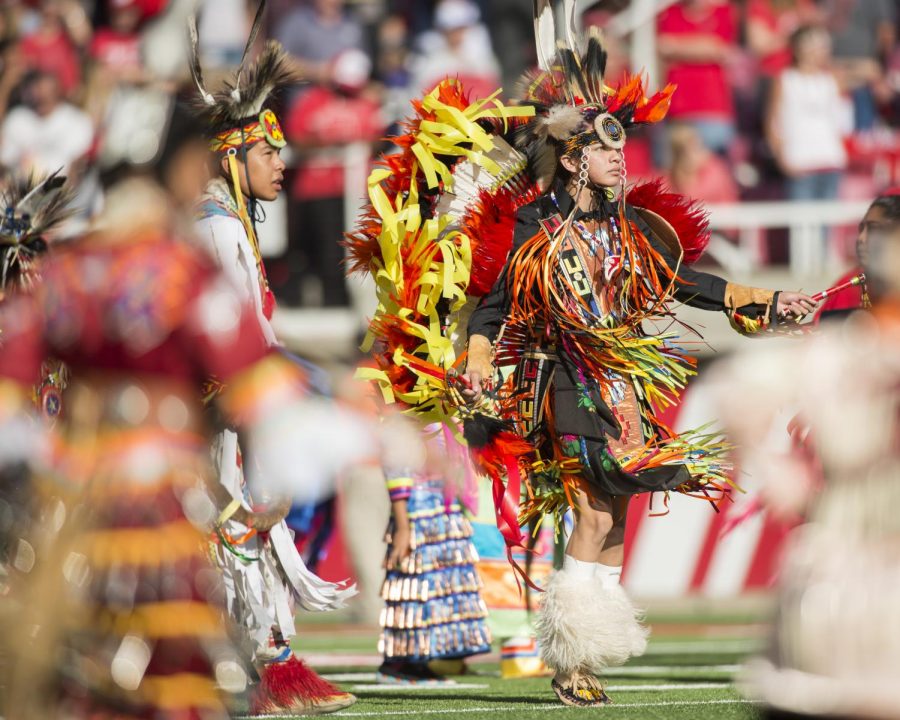Barron: University Wokeness Falls Short, Once Again
Members from the Ute Indian tribe performa a ritual dance during the game vs. the Washington Huskies at Rice-Eccles Stadium on Saturday, October 29, 2016. | Chronicle archives
November 24, 2020
This October the University of Utah formally released an Indigenous Land Acknowledgement recognizing, for the first time in 170 years, that the U was built on the traditional and ancestral homelands of the Shoshone, Paiute, Goshute and Ute Tribes. The U would not exist without this land which was seized from the Indigenous population by Mormon pioneers beginning in 1847. According to Elizabeth Kronk Warner, dean of the College of Law and co-chair of the Native American Land Use Committee, the acknowledgment serves as a reminder of the university’s historical connection to the tribes and its ongoing responsibility to native people in our community. Sadly, this is all the acknowledgment accomplishes.
Support Beyond the Sports Team
The final line in the U’s land acknowledgment reads, “The University of Utah is committed to serving Native communities … through research, education and community outreach activities.” Strangely, the acknowledgment’s webpage does not include a list of university-sponsored programs benefiting Indigenous peoples. Without this information, the university cannot be held accountable for prioritizing specific programs. By failing to make this information readily accessible, the U is undercutting its own commitment to these communities.
When asked by the Chronicle to enumerate on the U’s beneficial partnerships with indigenous people in Utah, Warner’s response was vague and focused on the memorandum of understanding (MOU) that allows the university’s sports teams to use the name “Utes.” This MOU is an example of the university’s complicated relationship with our native community, not an example of how the U serves indigenous people. While the MOU includes several provisions that benefit Utah’s native community, it may also be harmful to this same community as research indicates that viewing teams with an Indigenous name or mascot can be psychologically distressing for native people. The partnerships highlighted as part of the university service promised in the land acknowledgment should benefit native people without caveat.
An Incomplete Statement
According to the Native Governance Center, acknowledging a place’s history and heritage is not enough. For a land acknowledgment to be complete it must be met with action. After George Floyd’s murder, the U committed to “[making our] historically white institution more representative of and responsive to the diverse communities we serve.” In effect, the U promised to begin the process of decolonizing higher education at our institution, examining who is teaching, what the subject matter is and how it’s being taught. About a month later, the U announced the formation of a committee to reconsider university policies and practices that may perpetuate racism in the hiring and advancement of faculty. Sadly, there has been no public update on this committee’s progress.
At the same time, the U was promising to decolonize the classroom; adjunct professor Dr. Richard Hansen’s archaeological work in Guatemala was highlighted in a VICE documentary. In this interview, Hansen revealed himself as a modern-day colonizer. When asked about Hansen’s continued affiliation with the U’s anthropology department, the head of the department Dr. Jack Broughton responded that Hansen’s collaboration with the school is important as it provides opportunities for students to perform field research. Promises of decolonization are meaningless if the U does not take action to address problematic mindsets and behavior when it is inconvenient or conflicts with their other priorities.
Better than Nothing
While having an incomplete land acknowledgment is better than not having one at all, the U’s acknowledgment is unlikely to be effective even as just a reminder because the university is not requiring its use. Professors and departments who already incorporated informal land acknowledgments in their courses are the most likely to adopt the U’s new acknowledgment. For example, the U’s Law School is choosing to start school-sponsored events by reading the formal land acknowledgment, something they have done informally since at least 2016. In contrast, departments and instructors who have not acknowledged Utah as stolen land in their classes are unlikely to start because the U has made a statement available to them. The impact of this formal land acknowledgment will not exceed the historical impact of informal acknowledgments on campus.
Mary Ann Villarreal, the U’s vice president for Equity, Diversity and Inclusion, described the land acknowledgment as a “springboard” for future anti-racist work. However, before this springboard can be properly used, it must be reinforced. The U must provide infrastructure to ensure students, faculty and the larger community can hold them accountable for promises made in the acknowledgment. The U must also go beyond committing to decolonization and put their promises into action. Without these additions, the U’s land acknowledgment will placate white guilt without beginning to address the legacy of colonization in our state and at our university.








